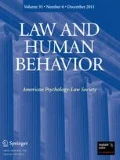Abstract
Three instruments assessing abilities related to legal standards for competence to consent to treatment were administered to 6 groups: patients recently hospitalized for schizophrenia, major depression, and ischemic heart disease, as well as three groups of non-ill persons in the community who were matched with the hospitalized patients on age, gender, race, and socioeconomic status. Significant impairments in decisional abilities were found for only a minority of persons in all groups. Both the schizophrenia and depression groups manifested poorer understanding of treatment disclosures, poorer reasoning in decision making regarding treatment, and a greater likelihood of failing to appreciate their illness or the potential benefits of treatment. Deficits were more pronounced, however, among patients with schizophrenia. Implications are discussed for policy designed to protect the rights and welfare of patients with mental illness who are at risk of incompetent refusal or consent when making treatment decisions.
Similar content being viewed by others
References
Appelbaum, P. S. (1988). The right to refuse treatment with antipsychotic medications: Retrospect and prospect.American Journal of Psychiatry, 145, 413–419.
Appelbaum, P. S., & Grisso, T. (1988). Assessing patients' capacities to consent to treatment.New England Journal of Medicine, 319, 1635–1638.
Appelbaum, P. S., & Grisso, T. (1992).Manual: Perceptions of disorder. Worcester, MA: University of Massachusetts Medical Center.
Appelbaum, P. S., & Grisso, T. (1995). The MacArthur Treatment Competence Study, I: Mental illness and competence to consent to treatment.Law and Human Behavior, 19, 105–126.
Appelbaum, P. S., & Roth, L. (1982). Treatment refusal in medical hospitals. In President's Commission for the Study of Ethical Problems in Medicine and Biomedical and Behavioral Research,Making health care decisions, Vol. 2. Washington, DC: U.S. Government Printing Office.
Appelbaum, P. S., & Schwartz, W. F. (1992). Minimizing the social cost of choosing treatment for the involuntarily hospitalized mentally ill patient: A new approach to defining the patiet's role.Connecticut Law Review, 24, 433–485.
Beck, A. (1978).Beck Depression Inventory. San Antonio TX: Psychological Corporation.
Clare, L., McKenna, P., Mortimer, A., & Baddeley, A. (1993). Memory in schizophrenia: What is impaired and what is preserved?Neuropsychologia, 31, 1225–1241.
Gold, J., & Harvey, P. (1993). Cognitive deficits in schizophrenia.Psychiatric Clinics of North America, 16, 295–312.
Grisso, T., & Appelbaum, P. S. (1991). Mentally ill and nonmentally-ill patients' abilities to understand informed consent disclosures for medication.Law and Human Behavior, 15, 377–388.
Grisso, T., & Appelbaum, P. S. (1992).Manual: Understanding treatment disclosures. Worcester MA: University of Massachusetts Medical Center.
Grisso, T., & Appelbaum, P. S. (1993).Manual: Thinking rationally about treatment. Worcester MA: University of Massachusetts Medical Center.
Grisso, T., Appelbaum, P. S., Mulvey, E., & Fletcher, K. (1995). The MacArthur Treatment Competence Study, II: Measures of abilities related to competence to consent to treatment.Law and Human Behavior, 19, 127–148.
Guy, W. (Ed.) (1976).ECDEU assessment manual for psychopharmacology (revised). Rockville, MD: U.S. Department of Health, Eduction and Welfare.
Hedlund, J., & Vieweg, B. (1980). The Brief Psychiatric Rating Scale: A comprehensive review.Journal of Operational Psychiatry, 11, 48–65.
Hoge, S. K. (1993). Personal communication.
Hoge, S. K., Appelbaum, P. S., Lawlor, T., Beck, J. C., Litman, R., Greer, A., Gutheil, T. G., & Kaplan, E. (1990). A prospective, multicenter study of patients' refusal of antipsychotic medication.Archives of General Psychiatry, 47, 949–956.
Hollingshead, A., & Redlich, F., (1958).Social class and mental illness. New York: John Wiley.
Lidz, C., Meisel, A., Zerubavel, E., Carter, M., Sestak, R., & Roth, L. (1984).Informed consent: A study of decisionmaking in psychiatry. New York: Guiford.
Marcus, S. C., Robins, L. N., Bucholz, K. K., & Przybeck, T. R. (1989).Diagnostic interview schedule screening instrument. St. Louis, MO: Department of Psychiatry, Washington University School of Medicine.
Overall, J. (1988). The Brief Psychiatric Rating Scale (BPRS): Recent developments in ascertainment and scaling.Psychopharmacology Bulletin, 24, 97–99.
Overall, J., & Gorman, D. (1962). The Brief Psychiatric Rating Scale.Psychological Reports, 10, 799–812.
Overall, J., & Klett, C. (1972).Applied multivariate analysis. New York: McGraw-Hill.
Rogers v. Commissioner, Dept' of Mental Health, 458 N.E. 2d 308 (Mass. 1983).
Wechsler, D. (1955).The measurement and appraisal of adult intelligence. Baltimore: Williams & Wilkins.
Zinermon v. Burch, 494 U.S. 113 (1990).
Author information
Authors and Affiliations
Additional information
This research was supported by the John D. and Catherine T. MacArthur Foundation Research Network on Mental Health and the Law. Other members of the Network are acknowledged for their conceptual guidance during the process of the study: Shirley Abrahamson, Richard Bonnie, Pamela Hyde, John Monahan, Stephen Morse, Ed Mulvey, Loren Roth, Paul Slovic, Henry Steadman, and David Wexler, as well as Steven K. Hoge. Acknowledged for their roles in data collection and statistical analysis are Kenneth Fletcher, Deidre Klassen and Cynthia Wickless. Requests for manuals for the MacArthur Treatment Competence Research Instruments.
About this article
Cite this article
Grisso, T., Appelbaum, P.S. The MacArthur Treatment Competence Study. III. Law Hum Behav 19, 149–174 (1995). https://doi.org/10.1007/BF01499323
Issue Date:
DOI: https://doi.org/10.1007/BF01499323




